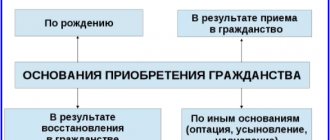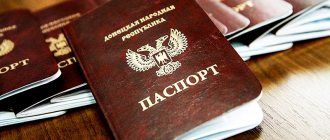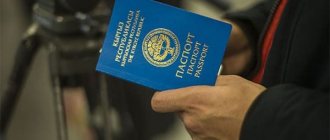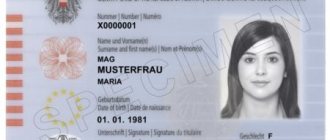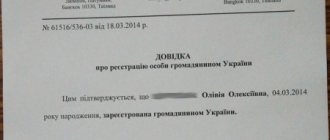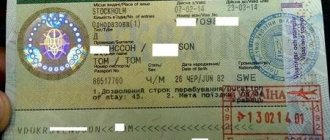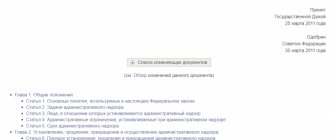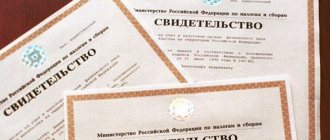Note to drivers
Many of our drivers found themselves confused after a statement from a representative of one of the traffic police MREOs of the Main Directorate of the Ministry of Internal Affairs of Russia for the Rostov Region that “citizens of the DPR, after obtaining Russian citizenship, must obtain Russian-style driver’s licenses.”
Later, Russian lawyer Yulia Gushchina gave clarifications about the driver’s license on the Pravoved website. She said that “the latest changes in the Law “On Traffic Safety” prohibit professional drivers with national licenses of other countries from working in the Russian Federation.” The lawyer added:
“To make it clearer: the answer to the question whether it is possible to work in the Russian Federation as a driver with a Ukrainian driver’s license is no. You can drive a personal car, but unfortunately you can’t work officially.”
So those who want to work as drivers in Russia must obtain not only a Russian passport, but also a Russian driver’s license, which will take a lot of time and money. To do this, you need to contact the traffic police department with an application and documents, pay fees, and pass exams. And if you have an old-style foreign driver’s license, you will even have to study at a driving school.
Donetsk resident Sergei Selivanov, citing personal experience, reported on Facebook that when crossing the border of the Russian Federation in a car with DPR license plates, the data of the republican passport must be entered into the passenger customs declaration - even if you have a Russian passport in hand. And nothing else - as long as you do not have permanent or temporary registration on the territory of the Russian Federation.
And when a mark about registration (propiska) on the territory of Russia appears in your Russian passport, you will be obliged to clear your car through customs - if it has DPR/Ukrainian license plates. Otherwise, as a citizen of the Russian Federation, you will have no legal grounds to drive a car with a license plate of the DPR or Ukraine. But if a resident of the DPR with a Russian passport does not plan to stay for permanent residence in Russia, then there is no need to register the car there.
Moscow lawyer Roman Vasiliev gives an interesting hint. Answering a question from one of the Donetsk residents regarding how to clear a car through customs, he said:
“According to the current legislation, citizens arriving (relocating) to the Russian Federation (a member state of the Customs Union) for permanent residence have the right to duty-free import of one car - provided that the import of the car into the Russian Federation from the country of previous residence is carried out no later than 18 months from the date of arrival of the specified persons for permanent residence,” the lawyer said.
How to obtain Russian citizenship for residents of the DPR and LPR in 2021
THIRD-CLASS COMMATRIOTS
In the state program for the resettlement of compatriots to Russia, you can read about a simplified scheme for obtaining citizenship, and about benefits and compensation, and in the appendix to the program - about one of the main requirements for an applicant to participate in the program for the resettlement of compatriots in Russia, namely: the mandatory presence the applicant has work experience, length of service, education and qualifications for employment. But neither in the “Program” itself, nor in the appendices to it, nor in the “Memos for compatriots returning to their homeland” there is absolutely no truthful information that when they reach retirement age in Russia, these same returning compatriots will have a big “surprise” – assigning them a minimum (social) pension, regardless of the number of years they worked during their working life, since with the entry into force of Federal Law No. 400-F3 “On Insurance Pensions” in the Russian Federation on January 1, 2015, their insurance (work) length of service , in particular, in Ukraine, from January 1, 2002 to the present (and this is now more than 15 years), which made it possible to acquire the above required work experience, was simply not taken into account when calculating pensions in the Russian Federation. Regardless of the payment by compatriots of all taxes, deductions and insurance contributions in the country in which they worked. The reason indicated in the official responses of the Ministry of Social Labor, the Pension Fund of the Russian Federation, the State Duma, etc. is “the absence of a mechanism for mutual settlements in terms of accounting for insurance premiums between Ukraine and Russia.” It is clear that if you do not take into account almost half of the work experience (about 20 years with the institute, the time of study in which, for example, mine, from 1973 to 1978, which made it possible to acquire the above required education and qualifications, in the Russian Federation since 2001 it began to be considered socially not significant and, thanks to the retroactive effect of the law, was not included in the length of service), then the pension is awarded as a parasite or a repeat offender - in the amount of the minimum social (I am writing, based, among other things, on my personal experience). Compatriots who have returned to their homeland will not be faced with the situation described above immediately, but only after a different number of years have passed - only upon retirement, but why hide this from people? “Better the bitter truth than a sweet lie!..” I believe that it would be much fairer, guided by universal human norms, to adopt, for example, an amendment to the law that would make it possible to take into account all honestly earned work experience and paid insurance contributions of compatriots who returned to their permanent place of residence in Russia when determining the size of their pension, otherwise In this case, all the loud calls for the return of compatriots to their homeland will remain deceptive slogans. Otherwise, what kind of compatriots are we?
Why do you need a passport?
Experts also advise those who have not yet turned 20 years old or from 40 to 45 years old, along with a passport of a citizen of the Russian Federation, be sure to also apply for a Russian foreign passport - even if you do not plan to travel abroad. Otherwise, you can fall into a bureaucratic trap.
If you are 20 or 45 years old, then according to Russian law you are required to change your passport within 30 days, otherwise it will become invalid and you will have to pay a fine of two to three thousand rubles. But you can start dealing with the issue of replacing your passport only the next day after you turn 20 or 45 years old. To do this, you need to go to Russia, to one of the migration departments. You will probably still be able to enter the territory of the Russian Federation with an already expired passport. But you can return back to the DPR only after you are issued a new passport as a citizen of the Russian Federation. And they will issue it and give it to you only after 30 days. That is, you will have to sit in Russia for a whole month waiting. Instead of your exchanged passport, you will be given a temporary identity card, but you cannot cross the border with it.
This problem is easily solved if you have a foreign passport - with it you can freely cross the border of the Russian Federation in one direction or the other. It is given for five years. Registration cost: 2,000 rubles for an adult and 1,000 for a child.
It is also better for your child to immediately apply for a foreign passport, because he becomes a citizen of the Russian Federation along with you. It is entered into your civil passport. But as soon as he turns 14 years old, you must take him to Russia to obtain a Russian passport. And again, you can bring a child into the territory of the Russian Federation (according to the entry in your passport and the child’s birth certificate), but you cannot take it back to the DPR. Because according to the laws of the Russian Federation, from the age of 14 he must have his own passport; he can only cross the border with it. And again, a Russian foreign passport will come to the rescue: if the child has it, then there will be no problems crossing the border.
Residents of Lugansk and Donetsk with Russian citizenship: what they can and cannot do
Upon receipt of a Russian passport, residents of Lugansk and Donetsk do not become full citizens of the Russian Federation, because they do not have registration (registration of place of residence) in Russia. And without registration, they are deprived of the opportunity to receive Russian pensions, bank cards, register children born in the Russian Federation, use cars with “republican” license plates, etc. for work. DPR People’s Council deputy Anastasia Selivanova spoke about this in an interview with a Russian publication.
After receiving a Russian passport, a resident of Lugansk or Donetsk must receive a Russian SNILS - the insurance number of an individual personal account.
“This is an analogue of the Ukrainian Taxpayer Identification Number, which is used to identify a person. It is issued free of charge, personal presence is required. You can get it both from the pension fund and from the multifunctional center (MFC). In the first case, they will give it to you immediately, in the second, you will have to wait... And having received SNILS, you can create an account on the State Services website (receiving documents, statements, etc.)... You can live with an unconfirmed account, but the number of portal functions for this category citizens will then be very limited,” Selivanova noted.
Also, the holder of a Russian passport can receive a health insurance policy. But according to it, medical services are provided only in Russia.
But residents of Donbass cannot count on a Russian pension, even if they are citizens of the Russian Federation according to their passport.
“The hopes of citizens that upon receiving a Russian passport they will receive pensions in the DPR and Russia, and even in Ukraine, are in vain. To receive a pension in the Russian Federation, you need to be registered on its territory,” the deputy emphasized.
Also, without registration (registration) in the Russian Federation they will not issue a bank card, but you can simply open a bank account.
Residents of Lugansk and Donetsk with Russian passports cannot register their born children in the Russian Federation.
“It turned out that our citizens, without registration on the territory of the Russian Federation, cannot register a child in Russia and they cannot obtain a birth certificate there either. That is, they can register a child only on the territory of the republic. At the same time, our citizens, when registering acts of civil status (birth, marriage, divorce, death), must present a DPR or Ukrainian passport, that is, the document that contains a mark about their registration on the territory of the republic... According to Russian legislation, a child receives Russian citizenship, if both parents had Russian citizenship at the time of his birth. But, unfortunately, his parents’ birth certificate indicates their citizenship is DPR,” Selivanova laments.
Residents who will soon turn 20 or 45 years old and need a replacement photo in their Russian passport are forced to additionally obtain a foreign passport. This is also due to the fact that “republicans” do not have registration in Russia - for such people, a photo is inserted into the passport and the passport is replaced within 30 days (for full-fledged citizens - 10 days). That is, they will be able to enter the Russian Federation for these procedures, but their passport will be confiscated for a while, and they will not be able to return to the LDPR - Russian border guards simply will not let them out. Having a LDPR passport does not help.
“According to the laws of the Russian Federation, citizens with multiple citizenship, and this includes citizens of the DPR who have received Russian citizenship, can cross the border with the Russian Federation only with a Russian passport. These clarifications are provided by the Federal Security Service of the Russian Federation. All these difficulties can be easily resolved if you have a Russian passport in your hands. Using it, you can freely cross the border of the Russian Federation in one direction or the other. It is given for 5 years and costs 2000 rubles. (770 UAH at the local exchange rate - ed.) for adults and children over 14 years old, 1000 rubles. (385 UAH) - for a child under 14 years old,” Selivanova explained.
Having a Russian passport does not solve the problem in Russia of car owners with “republican” license plates on their cars.
“The question arises: can a citizen of the Russian Federation, which you have become, but who does not have registration in a Russian passport, travel with DPR plates and licenses? Yes maybe. But only if the machine is not used for work. Keep in mind: if there is no registration in your Russian passport, you are not a resident of the Russian Federation, therefore, you can enter and exit Russia using DPR plates,” Selivanova noted.
And if a person has received a residence permit (registration) in the Russian Federation, even a fictitious one, then the issue with “republican” license plates becomes more complicated.
“From the moment you put permanent Russian registration in your passport, upon entry you need to clear the car through customs or pay a fee - an advance payment, as a guarantee that you will export the car. Temporary registration frees you from this,” the “Republican” continued.
The issue of registration is also difficult, despite the fact that the Internet is replete with offers for residents of the “LDPR” to sell fictitious registrations. The main nuance is that if they have a registration, men are subject to military registration, and therefore, conscription into the army.
“Some people register, others don’t. It is important to remember one thing here: permanent registration presupposes military registration. If you register in the Russian Federation, but at the same time permanently reside in the DPR, then this is a fictitious registration, and therefore be prepared for a fine if this fact is revealed,” Selivanova emphasized.
Source: Donetsk news
Politics - December 28, 2021 33680
Tags: Issuance of passports, Citizenship of the Russian Federation, Donetsk, News from Lugansk, Passport of a citizen of the Russian Federation, Registration
We would be very grateful if you share this news on social networks
Registration required
According to the Federal Law “On Citizenship”, the holder of a Russian passport automatically becomes a citizen of the Russian Federation and has all the rights and obligations of a citizen of the Russian Federation.
“A Russian passport allows you to obtain all the rights of a Russian citizen - the right to reside, the right to vote in elections, to work, to receive social benefits, including benefits, and the right to participate in government programs such as maternity capital. In this regard, you will need to register with all the necessary government institutions, including obtaining SNILS,” explains lawyer from Moscow Maxim Shepelev to residents of the DPR and LPR on the YouTube Internet channel.
He emphasized that the Russian passport itself without a registration mark will have the same force as with registration. This means that you will not be kicked out of the country. But for the state, the lack of registration is an offense. It is punishable by fines.
Maxim Shepelev also noted that residents of the People's Republics who have received Russian Federation passports must register (register) in Russia for official employment, treatment in medical institutions, receipt of pensions, benefits and other benefits.
“You will have to solve this issue yourself - either by registering with someone, or by buying a home and registering in it,” he says.
In turn, other Russian lawyers say that even temporary registration on the territory of the Russian Federation is enough to fully enjoy all the benefits. “Even while temporarily residing in the Russian Federation, citizens bear all responsibilities and have all rights,” Russian lawyer Pyotr Nizametdinov told a Donetsk Vecherny correspondent.
“You can have permanent registration (registration), or you can register temporarily, and at the same time obtain maternity capital, a pension, and so on. In general, you are the same citizen and bear the same responsibility as all other citizens of Russia,” Dmitry Aleksandrovich, a representative of the Moscow legal agency, explained in a telephone conversation to a Donetsk Vecherny correspondent.
